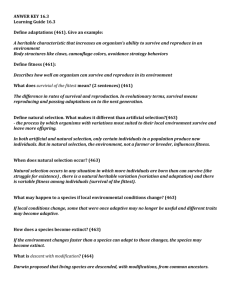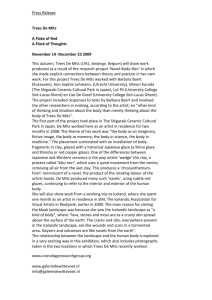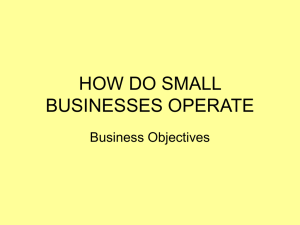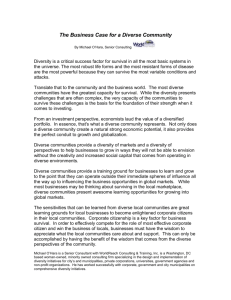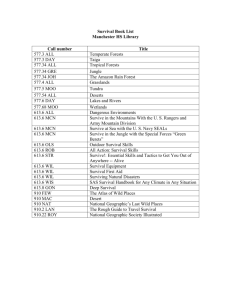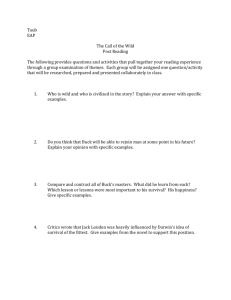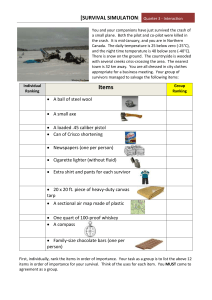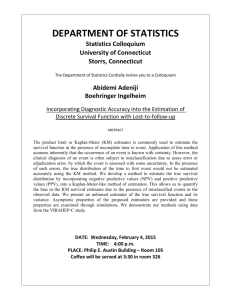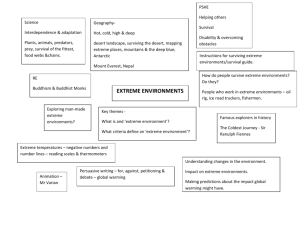Hayakawa, Chapter 1: Language and Survival
advertisement
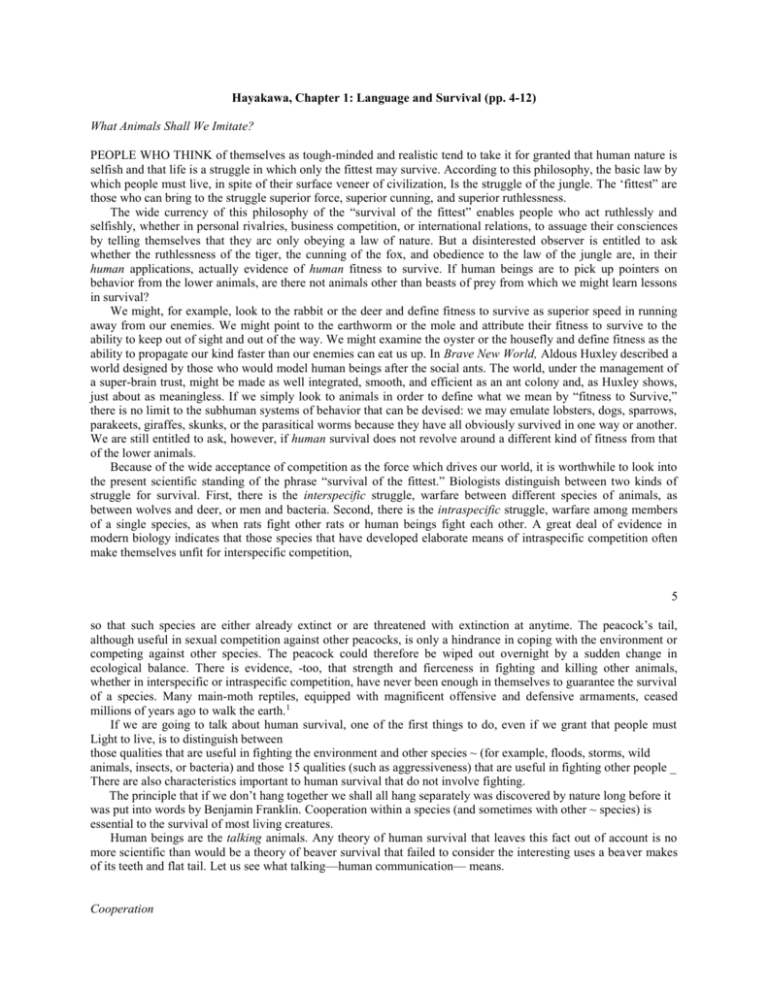
Hayakawa, Chapter 1: Language and Survival (pp. 4-12) What Animals Shall We Imitate? PEOPLE WHO THINK of themselves as tough-minded and realistic tend to take it for granted that human nature is selfish and that life is a struggle in which only the fittest may survive. According to this philosophy, the basic law by which people must live, in spite of their surface veneer of civilization, Is the struggle of the jungle. The ‘fittest” are those who can bring to the struggle superior force, superior cunning, and superior ruthlessness. The wide currency of this philosophy of the “survival of the fittest” enables people who act ruthlessly and selfishly, whether in personal rivalries, business competition, or international relations, to assuage their consciences by telling themselves that they arc only obeying a law of nature. But a disinterested observer is entitled to ask whether the ruthlessness of the tiger, the cunning of the fox, and obedience to the law of the jungle are, in their human applications, actually evidence of human fitness to survive. If human beings are to pick up pointers on behavior from the lower animals, are there not animals other than beasts of prey from which we might learn lessons in survival? We might, for example, look to the rabbit or the deer and define fitness to survive as superior speed in running away from our enemies. We might point to the earthworm or the mole and attribute their fitness to survive to the ability to keep out of sight and out of the way. We might examine the oyster or the housefly and define fitness as the ability to propagate our kind faster than our enemies can eat us up. In Brave New World, Aldous Huxley described a world designed by those who would model human beings after the social ants. The world, under the management of a super-brain trust, might be made as well integrated, smooth, and efficient as an ant colony and, as Huxley shows, just about as meaningless. If we simply look to animals in order to define what we mean by “fitness to Survive,” there is no limit to the subhuman systems of behavior that can be devised: we may emulate lobsters, dogs, sparrows, parakeets, giraffes, skunks, or the parasitical worms because they have all obviously survived in one way or another. We are still entitled to ask, however, if human survival does not revolve around a different kind of fitness from that of the lower animals. Because of the wide acceptance of competition as the force which drives our world, it is worthwhile to look into the present scientific standing of the phrase “survival of the fittest.” Biologists distinguish between two kinds of struggle for survival. First, there is the interspecific struggle, warfare between different species of animals, as between wolves and deer, or men and bacteria. Second, there is the intraspecific struggle, warfare among members of a single species, as when rats fight other rats or human beings fight each other. A great deal of evidence in modern biology indicates that those species that have developed elaborate means of intraspecific competition often make themselves unfit for interspecific competition, 5 so that such species are either already extinct or are threatened with extinction at anytime. The peacock’s tail, although useful in sexual competition against other peacocks, is only a hindrance in coping with the environment or competing against other species. The peacock could therefore be wiped out overnight by a sudden change in ecological balance. There is evidence, -too, that strength and fierceness in fighting and killing other animals, whether in interspecific or intraspecific competition, have never been enough in themselves to guarantee the survival of a species. Many main-moth reptiles, equipped with magnificent offensive and defensive armaments, ceased millions of years ago to walk the earth.1 If we are going to talk about human survival, one of the first things to do, even if we grant that people must Light to live, is to distinguish between those qualities that are useful in fighting the environment and other species ~ (for example, floods, storms, wild animals, insects, or bacteria) and those 15 qualities (such as aggressiveness) that are useful in fighting other people _ There are also characteristics important to human survival that do not involve fighting. The principle that if we don’t hang together we shall all hang separately was discovered by nature long before it was put into words by Benjamin Franklin. Cooperation within a species (and sometimes with other ~ species) is essential to the survival of most living creatures. Human beings are the talking animals. Any theory of human survival that leaves this fact out of account is no more scientific than would be a theory of beaver survival that failed to consider the interesting uses a beaver makes of its teeth and flat tail. Let us see what talking—human communication— means. Cooperation If someone shouts at you, “Look out!’ and you jump just in time to avoid being struck by a car, you owe your escape from injury to the fundamental cooperative act by which most of the higher animals survive: namely, communication by means of noises. You did not see the car coming; nevertheless, someone did see it and made certain noises to communicate the alarm to you. In other words, although your nervous system did not record the danger, you were unharmed because another’s nervous system did. You had, for the time being, the advantage of an extra nervous system in addition to your own. _______ 1 For example, the brain of the massive (about two tons) stegosaur weighed only about 70 grams, or 2½ ounces. . . . By contrast, even the brain of the sheep—which Is not a particularly brilliant animal—weighs shout 130 grams, greater both in absolute size and even more so relatively to body size. . So far as strength is concerned, nothing could stop one of the great dinosaurs when it was on its way; but while it is all very well to be able to go where you ore going, the reasons for going and what is seen and understood on the way are even more important. Weston La Barre, The Human Animal (1954), pp. 24—25. 6 Indeed, most of the time when we are listening to the noises people make, or looking at the black marks on paper that stand for such noises, we are drawing upon the experiences of others in order to make up for what we ourselves have missed. Now, obviously, the more we can make use of the nervous systems of others to supplement our own, the easier it is for us to survive. And, of course, the more individuals there are in a group accustomed to cooperating by making helpful noises at each other, the better it is for all—within the limits, naturally, of the group’s talents for organization. Birds and animals congregate with their own kind and make noises when they find food or become alarmed. In fact, gregariousness as an aid to self-defense and survival is forced upon animals as well as upon human beings by the necessity of uniting nervous systems even more than by the necessity of uniting physical strength. Societies, both animal and human, might almost be regarded as huge cooperative nervous systems. While animals use only a few limited cries., however, human beings use extremely complicated systems of sputtering, hissing, gurgling, clucking, and cooing noises called language, with which they express and report what goes on in their nervous systems. Language Is, in addition to being more complicated, immeasurably more flexible than the animal cries from which it was developed—so flexible indeed that ft can be used not only to report the tremendous variety of things that go on in the human nervous system, but to report those reports. That is, when an animal yelps, it may cause a second animal to yelp in imitation or in alarm, but the second yelp is not about the first yelp. But when someone says, “I see a river,” a second person can say. “He says he sees .a river’—which is a statement about a statement. About this statement-about-a-statement further statements can be made—and about those, still more. Language, in short, can be about language. This is a fundamental way in which human noisemaking systems differ from the cries of animals. The Pooling of Knowledge In addition to having developed language, human beings have also developed means of making, on clay tablets, bits of wood or stone, skins of animals, paper and microchips, more or less permanent marks and scratches that stand for language. These marks enable us to communicate with people who are beyond the reach of our voices, both in space and in time. There is a long course of evolution from the marked trees that indicated Indian hails to the metropolitan daily newspaper, but they have this in common: they pass on what one individual has known to other individuals for their convenience or, in the broadest sense, instruction. Many of the lobstick trails in the Canadian woods, marked by Indians long since dead, can be followed to this day. Archimedes is dead, but we still have 7 his reports about what he observed in his experiments in physics. Keats is dead, but his poetry can still tell us how he felt on first reading Chapman’s Homer. Elizabeth Barrett is dead, but we can know how she felt about Robert Browning. From books and magazines, we learn how hundreds of people whom we shall never be able to see have felt and thought. Satellites transmit facts about the world we live in to our newspapers, radios, and televisions. All this information is useful to us at one time or another in solving our own problems. Human beings, then, are never dependent for information on direct experience alone. Even those in a primitive culture can make use of the experience of neighbors, friends, relatives, and ancestors, communicated by means of language. Therefore, instead of remaining helpless because of the limitations of their own experience and knowledge, instead of having to rediscover what others have already discovered, instead of exploring the false trails others have explored and repeating theft errors, they can go on from where others left off Language, that is to say, makes progress possible. Indeed, most of what we call the human characteristics of our species is expressed and developed through our ability to cooperate by means of our systems of making meaningful noises and meaningful scratches on paper. Even people who belong to cultures in which writing has not been invented are able to exchange information and to hand down from generation to generation considerable stores of traditional knowledge. There seems, however, to be a limit both to the trustworthiness and to the amount of knowledge that can be transmitted orally. This is so despite the fact that preliterate people often exhibit remarkable feats of memory, such as the ability to remember every landmark and detail of a journey of hundreds of miles or the ability to recall verbatim folktales and sagas that may take days to recite, Literate people, who rely on notebooks and reference books, have relatively poor memories. Still, when writing is invented, a tremendous step forward is taken. The accuracy of reports can be checked and rechecked by successive generations of observers. The amount of knowledge accumulated ceases to be limited by people's ability to remember what has been told them. The result is that in any literate culture of a few centuries’ standing, human beings accumulate vast stores of knowledge—far more than any individual in that culture can read in his lifetime, let alone remember. These stores of knowledge, which are being added to constantly, are made widely available to all who want them through such mechanical processes as printing and computer data banks and through such distributive agencies as the book trade, the newspaper and magazine trade, library systems, and computer networks. All of us who can read any of the major European or Asian languages are potentially in touch with the intellectual resources of centuries of human endeavor in all parts of the civilized world. 8 A physician, for example, who does not know how to treat a patient suffering from a rare disease can look up the disease in the Index Medicus, which may send him or her in turn to medical journals, or to a computer data service like Medline to find articles and abstracts indexed by the National Medical Library. In so doing, the physician may find records of similar cases as reported and described by a physician In Rotterdam in 1873, by another physician in Bangkok in 1909, and by still other physicians in Kansas City in 1974 Such records may shed light on the case at hand. Again, a person worried about ethics is not dependent merely upon the pastor of the Elm Street Baptist Church, but may consult Confucius, Aristotle, Jesus, Spinoza, and many others whose reflections on ethical problems are on record. If one is worried about love, one can get advice not only from one’s parents or friends, but from the works of Sappho, Ovid, Propertius, Shakespeare, John Donne, Erich Fromm, or any of a thousand others who knew something about it and wrote down what they knew. Language is the indispensable mechanism of human life—of life such as ours that is molded, guided, enriched, and made possible by the accumulation of the past experience of members of our species. Dogs, eats, or chimpanzees do not, so far as we can tell, increase their wisdom, their information, or their control over their environment from one generation to the next. Human beings do. The cultural accomplishments of the ages, the invention of cooking, of weapons, of writing, of printing, of methods of building, of games and amusements, of means of transportation, and the discoveries of all the arts and sciences come to us as free gifts from the dead, These gifts, which none of us has done anything to earn, offer us not only the opportunity for a richer life than any of our forebears enjoyed but also the opportunity to add to the sum total of human achievement by our own contributions, however small. To be able to read and write, therefore, is to learn to profit by and to take part in the greatest of human achievements—that which makes all other human achievements possible—namely, the pooling of our experience in great cooperative stores of knowledge, available (except where special privilege, censorship, or suppression stand in the way) to all. From the warning cry of the savage to the latest scientific monograph or news bulletin, language is social. Cultural and intellectual cooperation is, or should be, the great principle of human life. This is by no means an easy principle to accept or to understand— except as a kind of pious truism that we, as wellmeaning people, would like to believe. We live in a highly competitive society, each of us trying to outdo the other in wealth, in popularity or social prestige, in dress, in scholastic grades, or in golf scores. As we read our daily papers, there is always news of conflict rather than of cooperation—between labor and management, between rival corporations or movie stars, between political parties and nations. Over us all hangs the perpetual fear of another war 9 even mote unthinkably horrible than the last. One is often tempted to say that conflict, rather than cooperation, is the great governing principle of human life. But what such a philosophy overlooks is that despite all the competition at the surface, there is a huge substratum of cooperation taken for granted that keeps the world going. The coordination of the efforts of actors, writers, engineers, musicians, photographers, utility companies, typists, program directors, advertising agencies, and hundreds of others is required to create a single television program. Tens of thousands of persons cooperate in the production of automobiles, including suppliers and shippers of raw materials from different parts of the earth. Any organized business activity is an elaborate act of cooperation in which every individual worker contributes a share. A lockout or strike is a withdrawal of cooperation: things are regarded as “back to normal” when cooperation is restored, As individuals we may compete for jobs, but our function in the job, once we get it, is to contribute, at the right time and place, to that innumerable series of cooperative acts that eventually results in ears being manufactured, in cakes appearing in pastry shops, in department stores serving their customers, in trains and airlines running on schedule. This network of cooperation is intricate and complex, and it has been relatively effective. But because it rests so profoundly upon human agreement, it is also fragile. Small groups of dissidents using such tactics as intimidation and violence can disrupt society and create chaos, breaking down the network of cooperation. What is important for our purposes here is that all this coordination for the functioning of society is of necessity achieved by language, or else it t~ not achieved at all. The Niagara of Words And how does all this affect you and me—and the celebrated “Man in the Street”—or “‘I’. C. Mits,” as he was christened by Lillian and Hugh Lieber of Long Island University in their book The Education of C. Mitt From the moment he switches on a morning news broadcast until he falls asleep at night over a novel or in front of the television, Mits is, like all other people living in the modern world, immersed in words. Newspaper editors, politicians, salesmen, disc jockeys, columnists, luncheon speakers and clergymen; colleagues, friends, relatives, wife and children; market reports, direct-mail advertising, books, billboards, talk shows—all assail him with words, all day long. And Mits himself is constantly contributing to that Niagara every time he puts on an advertising campaign, delivers a speech, writes a letter, or chats with friends. When things go wrong in Mits’s life—when he is worried, perplexed, or nervous; or when family, business, or national affairs are not going as 10 he thinks they should—he blames a number of things: the weather, his health, the state of his nerves, or his colleagues at work. If the problem is larger, he may blame his environment, the economic system, a foreign nation, or the cultural patterns of society. The difficulties of other people he may attribute to these causes or to “human nature.” It rarely occurs to him to investigate the nature of that daily verbal Niagara as a possible source of trouble. Indeed, there are few occasions on which Mits thinks about language as such. He pauses from time to time over a grammatical point. Occasionally he runs into advertisements on “how to increase your word power” and wonders if he shouldn’t try to become a more effective speaker. Confronted by the Niagara of words—the magazines he hasn’t time to keep up with and the books he knows he should read—he wonders if a course in speed-reading wouldn’t help. Once in a while he is struck by the fact that some people—always other people—twist the meanings of words, especially during the course of an argument, so that words are often very tricky. Sometimes he notices with irritation that words can mean different things. This condition, he feels, could be corrected if people would only consult dictionaries to learn the “true meanings” of words. lie knows, however, that they will not—at least no more often than he does—so he puts this down as another instance of the weakness of human nature. This is unfortunately about the limit of l~4its’s linguistic speculation. And here Mits is typical not only of the general public but also of many scientists, publicists, and writers. Like most people, he takes words as much for granted as the air he breathes, and he gives them about as much thought. Nevertheless, Mits is profoundly involved in the words he absorbs and uses daily. Words in the newspaper make him pound his fist on the breakfast table. Words spoken to him by his superiors puff him up with pride or send him scurrying to work harder. Words that he has overheard being spoken about him behind his back worry him sick. Words that he spoke before a clergyman some years ago have committed him to one woman for life. Words written on pieces of paper keep him at his job and bring bills in the mail every month that keep him paying and paying. With words woven into almost every detail of his life, it seems amazing that Mits’s thinking about language should be so limited. Mits may have noticed that when large masses of people, for example those under totalitarian regimes, are permitted to hear and read only carefully selected words, their conduct becomes so strange that he can only regard it as mad. Yet he regards some individuals who have the same education and the same access to varied sources of information as being nevertheless just as mad. He listens to the views of some of his neighbors and cannot help wondering, ‘How can they think such things? Don’t they see 11 the same things happening that I see? They must be crazy!” “Does such madness,” he asks, “illustrate again the inevitable frailty of human nature’?” Mits, who as an American likes to regard all things as possible, does not like the conclusion that “nothing can be done about it,” but often he can hardly see how to escape it. One reason for Mit’s failure to get any further in thinking about language is tie belief that words are not really important: what is important is the “ideas” they stand for. But what is an idea if it is not the verbalization of a cerebral itch? This has seldom occurred to Mits. The fact that the implications of one set of terms may lead inevitably into blind alleys, while the implications of another set of terms may not; the fact that the historical or sentimental associations of some words make calm discussion impossible; the fact that language has a multitude of different kinds of use and that great confusion arises from mistaking one kind of use for another; the fact that a person speaking a language of a structure entirely different from that of English, such as Japanese, Chinese, or Turkish, may not even think the same thoughts as an English-speaking person—these are unfamiliar no-dons to Mits, who has always assumed that the important thing is to get one’s ideas straight first, after which the words take care of themselves Whether he realizes it or not, however, Mits is affected every hour of his life not only by the words he hears and uses but also by his unconscious assumptions about language. If, for example, he likes the name Albert and would like to christen his child by that name but avoids doing so because he once knew an Albert who committed suicide, he is operating, whether he realizes it or not, under certain assumptions about the relationship of language to reality. Such unconscious assumptions determine the way he acts, whether wisely or foolishly. Words—the way he uses them and the way he takes them when spoken by others—largely shape his beliefs, his prejudices, his ideals, his aspirations. They constitute the moral and intellectual atmosphere in which he lives—in short, his semantic environment. This book is devoted, then, to the study of relationships among language, thought, and behavior. We shall examine language and people’s linguistic habits as they reveal themselves in thinking (at least nine-tenths of which is talking to one’s sell), speaking, listening, reading, and writing. Disarmament Conference 12 It will be the basic assumption of this book that widespread intraspecific cooperation through the use of language is the fundamental mechanism of human survival. A parallel assumption will be that when the use of language results, as It so often does, in the creation or aggravation of disagreements and conflicts, there Is something linguistically wrong with the speaker, the listener, or both. Human fitness to survive requires the ability to talk, write, listen, and read in ways that increase the chances for you and fellow members of the species to survive together.
